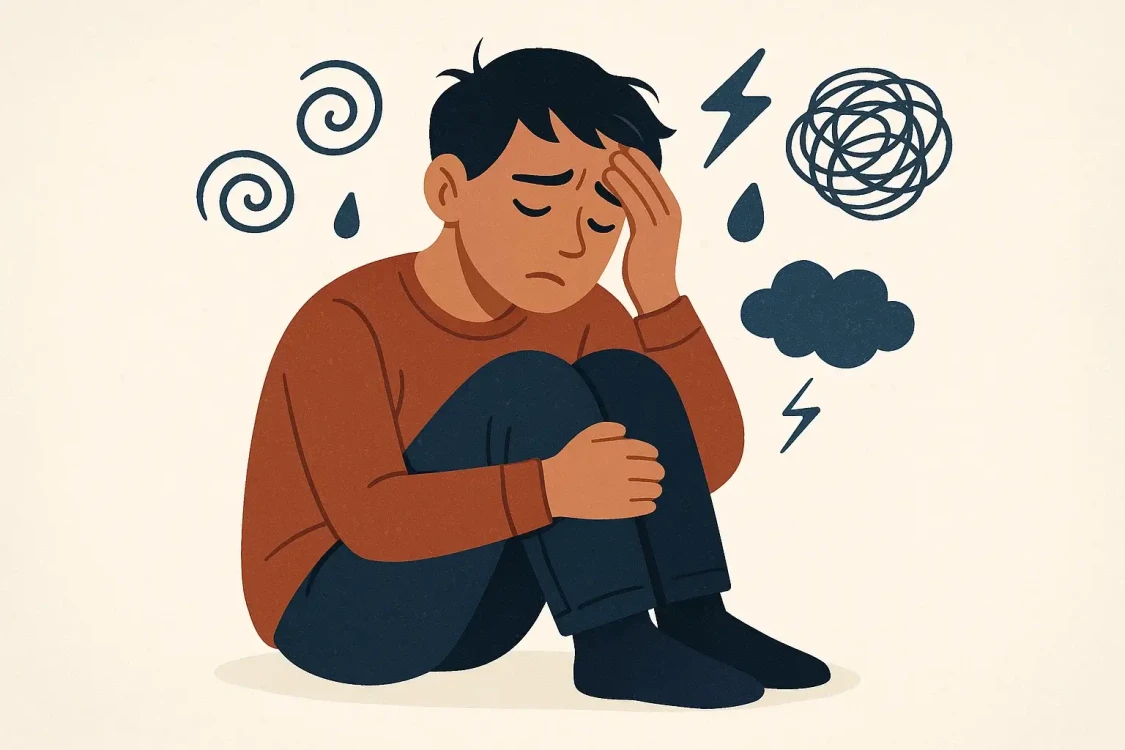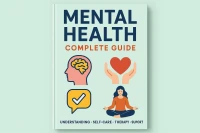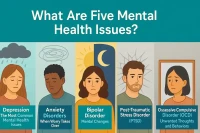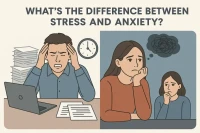You might notice your teenager isn't eating dinner with the family anymore. It starts small - they stay in their room more often. Then their grades drop from A's to C's practically overnight. You might see it as just typical teenage behavior. But then you notice these warning signs of mental illness have been growing for weeks.
Mental health warning signs don't announce themselves with flashing lights. They creep up slowly, disguised as bad moods or stress. Your spouse might seem more tired than usual after work. Your college daughter stops calling as much. These small changes in emotional and mental health are often overlooked. But eventually, they become hard to ignore.
Early detection changes everything, though. Recognizing mental health symptoms early can really help. People who do so within the first few months recover much better than those who wait years. The difference is big. You have shorter treatment periods. You stay in the hospital less. Plus, you get back to your normal life much faster. Learning to spot early signs of mental health issues is crucial for families everywhere.
What Are Mental Health Issues?
What is considered a mental health issue?
A condition that affects how a person feels, thinks, or acts can disrupt daily life.
Mental illness symptoms can include:
- Persistent anxiety
- Long-lasting depression
- Bipolar disorder with severe mood swings.
- Emotional and behavioral issues that alter personalities.
These symptoms can deeply affect daily life.
These conditions aren't character flaws or personal weaknesses. Mental disorders are real medical issues that affect brain chemistry and function. Symptoms can differ greatly, but they have one main feature: they last longer than regular emotions and disrupt daily life.
How are mental health issues different from temporary stress?
Regular stress has a clear beginning and end. You're stressed about a work presentation, you give the presentation, and the stress fades. Mental health disorders signs and symptoms don't follow that pattern. Signs of mental illness persist regardless of external circumstances. Someone with depression might feel hopeless even after getting good news. These conditions build their own momentum, no matter what is happening in someone’s life.
Why Is It Important to Recognize Early Signs?
Why should mental health issues be identified early?
Because catching psychiatric symptoms early prevents them from taking over someone's entire life. Think of it like a small fire - easier to put out with a garden hose than waiting until you need the fire department.
Research shows that early intervention helps improve outcomes for all mental health conditions. Getting help in the first few months leads to faster recovery. It also means less intensive treatment and better relationships during the process. Family and mental health outcomes improve significantly with early recognition as well.
Behavioral health screening during early stages identifies problems when they're most treatable.
Early mental health intervention helps all five aspects of health:
- Physical
- Emotional
- Social
- Intellectual
- Spiritual
Each area gains support from timely action.
Addressing mental health issues early helps prevent problems at work, home, and in life.
What Are the Early Signs of Mental Health Issues?
Emotional Symptoms
Ongoing sadness that doesn’t fit a person’s life events is a clear sign of mental health issues. This isn't just normal grief or disappointment. It's a deep sadness that lasts for weeks. It has no clear triggers and doesn't fade, even with positive events.
You might watch someone go from laughing easily to seeming emotionally flat all the time. They aren't crying or dramatically upset, just absent emotionally. Emotional withdrawal can signal growing depression or other mood disorders. These issues often impact mental and emotional stability.
Frequent mood swings that seem way out of proportion create another red flag. A person can go from calm to angry if dinner is delayed by ten minutes. Intense emotional reactions often show signs of psychiatric issues that need professional help.
People with early signs of mental illness often lose interest in activities they used to enjoy. Someone who loved weekend hiking suddenly can't be bothered to go outside. When fun activities become a burden, families and healthcare providers should take notice.
Behavioral Changes
Social withdrawal represents one of the most visible signs of mental health problems. People decline invitations, avoid calls, or seem distant, even when they’re present. They may attend family gatherings, but join conversations or activities very little.
A drop in work or school performance often happens slowly. However, it becomes clear to supervisors, teachers, or family members. Someone who never missed deadlines starts turning projects in late. These changes are worrisome. They mark a big shift from usual behaviors.
People often turn to substance use to cope with uncomfortable mental symptoms. Maybe someone who used to have a glass of wine with dinner now needs several drinks every evening. People often don't realize they're self-medicating emotional distress, which can complicate treatment later.
Physical Symptoms
Fatigue and low energy can impact daily life. This happens even if people stick to a regular sleep schedule. Everything seems tougher than it should be. Simple tasks, like grocery shopping, feel like big projects needing a lot of effort.
Sleep and appetite changes occur in approximately 90% of people developing mood-related conditions. Some people feel tired but can't sleep. Others want to sleep all the time but still feel worn out. Appetite can either vanish or spike sharply. This often causes noticeable weight changes that worry family members.
Frequent unexplained aches, headaches, digestive issues, or muscle tension may signal mental disorders. These symptoms often arise without clear medical reasons. Physical symptoms of mental illness are real medical concerns. They frequently improve when we treat the underlying psychological issues.
Cognitive Changes
Confused thinking can be an early sign of mental health issues. It may show up as difficulty with daily tasks or making simple choices. People can spend twenty minutes in a store deciding between two products they know well.
Difficulty concentrating affects work performance, academic achievement, and social interactions. Reading becomes challenging because attention wanders constantly. Following conversations requires extra effort. Routine information can be hard to remember. This leads to frustration and additional stress for individuals and their families.
Perceptual changes, such as altered senses or strange thoughts, can indicate serious issues. These may require quick evaluation by a professional. These symptoms often concern family members. They notice their loved one talking about experiences that feel disconnected from reality.
How Do Early Signs Differ by Age Group?
In Teens
Signs of mental illness in teenagers can show up in various ways. These signs include a sudden drop in grades after previously doing well, withdrawing from friends, and increased irritability that goes beyond normal mood swings. These changes can confuse parents.
In Adults
Adults with early signs of mental health issues often feel overwhelmed by work stress. This stress can seem too high for their job demands. They might feel burnout at work. To cope with daily stress, they may turn to substances. They may face issues in their relationships or money troubles. These challenges can make it hard to handle adult responsibilities well.
In Seniors
Mental health changes in older adults often get mistaken for normal aging processes. Memory issues, confusion, and withdrawing from social activities aren’t just signs of aging. These signs may indicate treatable psychiatric issues. With the right help, things can get better.
When Should You Seek Professional Help?
When is it time to see a mental health professional?
If symptoms last two weeks or more, affect daily life, or include thoughts of self-harm or suicide, get a professional evaluation. Mental health professionals can assess symptom patterns and recommend appropriate treatment approaches.
Here are more signs to seek help:
- Family members may notice changes in behavior.
- Work or school performance might drop sharply.
- Symptoms could disrupt key relationships and social ties, impacting overall well-being.
How Can You Respond to Early Signs?
What should you do if you notice these signs?
Begin open conversations with people displaying concerning symptoms. Show that you care and want to support them. Avoid trying to diagnose or solve their problems on your own. Promote simple self-care habits. Get enough sleep, exercise regularly, and eat healthy. These practices help boost mental wellness.
Suggest therapy or counseling as normal and helpful resources, not just last resorts. People are more likely to seek mental health help if they view it as preventive care, not just crisis intervention. This approach encourages voluntary help.
Final Thoughts
Mental health support is easy to find today. Early intervention helps improve treatment outcomes for all kinds of psychological conditions. Noticing warning signs of mental health issues is the first step to staying emotionally stable during tough times. Acting early helps people recover faster. It also boosts long-term health for them and their families.





Comments